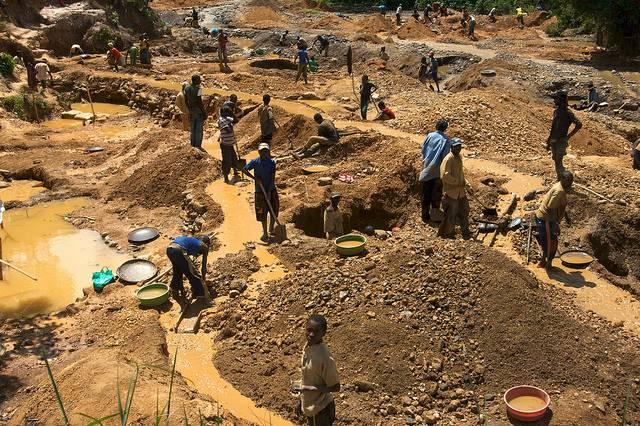
President Donald Trump may be poised to order the Securities and Exchange Commission to suspend a 2010 rule requiring companies to disclose whether they use conflict minerals. That's according to an apparent leaked draft of a presidential directive obtained earlier this week by The Intercept.
Publications including Reuters could not verify the authenticity of the document. But sources the news agency contacted said the Trump administration is prepared to instruct the SEC to suspend the rule for two years.
The rule, which is often known as Section 1502 of the 2010 Dodd-Frank Act, instructs companies that report to the SEC to share information about their procurement of metals and minerals including tantalum, tin, gold or tungsten. Such disclosure is mandatory if those materials are “necessary to the functionality or production” of a product contracted for, or manufactured by, a company.
The rule was designed to discourage companies from buying these materials from countries notorious for human rights violations, including the Democratic Republic of the Congo.
NGOs and human rights activists often hailed the rule as a way for companies to source raw materials more sustainably and responsibly. But the U.S. Chamber of Commerce and National Association of Manufacturers filed a lawsuit in federal court to stop the legislation.
Most of the regulations were upheld after a 2015 ruling, though companies no longer have to designate products as “not been found to be DRC conflict free” due to that federal court’s interpretation of the First Amendment. But according to Global Witness, an NGO that has long campaigned against corruption and human rights abuses in central Africa, the vast majority of the companies subjected to Dodd-Frank disclosures are not meeting the minimum requirements of the law.
The leaked document was released days before Trump met with Intel CEO Brian Krzanich, who later announced the company will build a $7 billion plant in Arizona that would employ as many as 3,000 workers. To some, such as Slate writer Jordan Weissmann points out, the meeting is part of a new corporate strategy to credit Trump with investment in jobs, whether or not the White House had anything to do with new plant openings or hiring.
Intel is one of many large technology companies that lobbied Congress while Dodd-Frank was debated before its 2010 passage. After Dodd-Frank become law, Intel pledged to ensure that its supply chain is “conflict free,” although investigations of Congo’s metal industry found that conditions in Congo have at the most only improved slightly.
Meanwhile, industry groups keep complaining that the cost of compliance is far too high.
The proposed suspension of Section 1502 should come as no surprise considering Trump’s rhetoric during the presidential campaign. While the legislation was passed as a response to the 2008-2009 global financial meltdown, Trump is on the record saying he wants to “do a big number” on Dodd-Frank -- claiming it makes it nearly impossible for small- and medium-sized businesses, including his “friends,” to access credit.
But other analysts say that while smaller banks have struggled due to the more restrictive rules on issuing mortgages and commercial loans, such legislation was necessary to prevent the excesses that led to the near collapse of the U.S. financial sector.
Finally, while the implementation of Section 1502 has been far from perfect, it at a minimum raised awareness of the corruption and environmental disaster resulting from the conflict minerals trade. And that ground gained may now be at risk.
Image credit: ENOUGH Project/Flickr

Leon Kaye has written for 3p since 2010 and become executive editor in 2018. His previous work includes writing for the Guardian as well as other online and print publications. In addition, he's worked in sales executive roles within technology and financial research companies, as well as for a public relations firm, for which he consulted with one of the globe’s leading sustainability initiatives. Currently living in Central California, he’s traveled to 70-plus countries and has lived and worked in South Korea, the United Arab Emirates and Uruguay.
Leon’s an alum of Fresno State, the University of Maryland, Baltimore County and the University of Southern California's Marshall Business School. He enjoys traveling abroad as well as exploring California’s Central Coast and the Sierra Nevadas.














